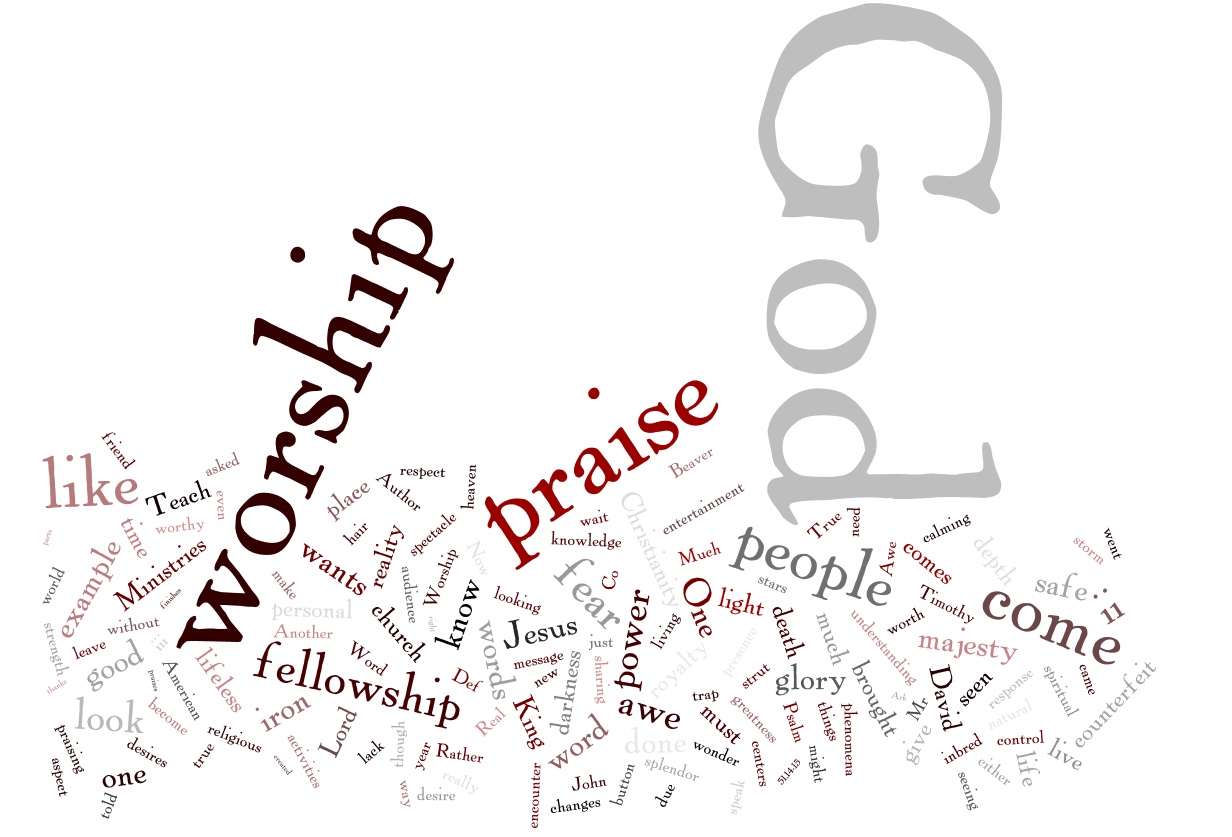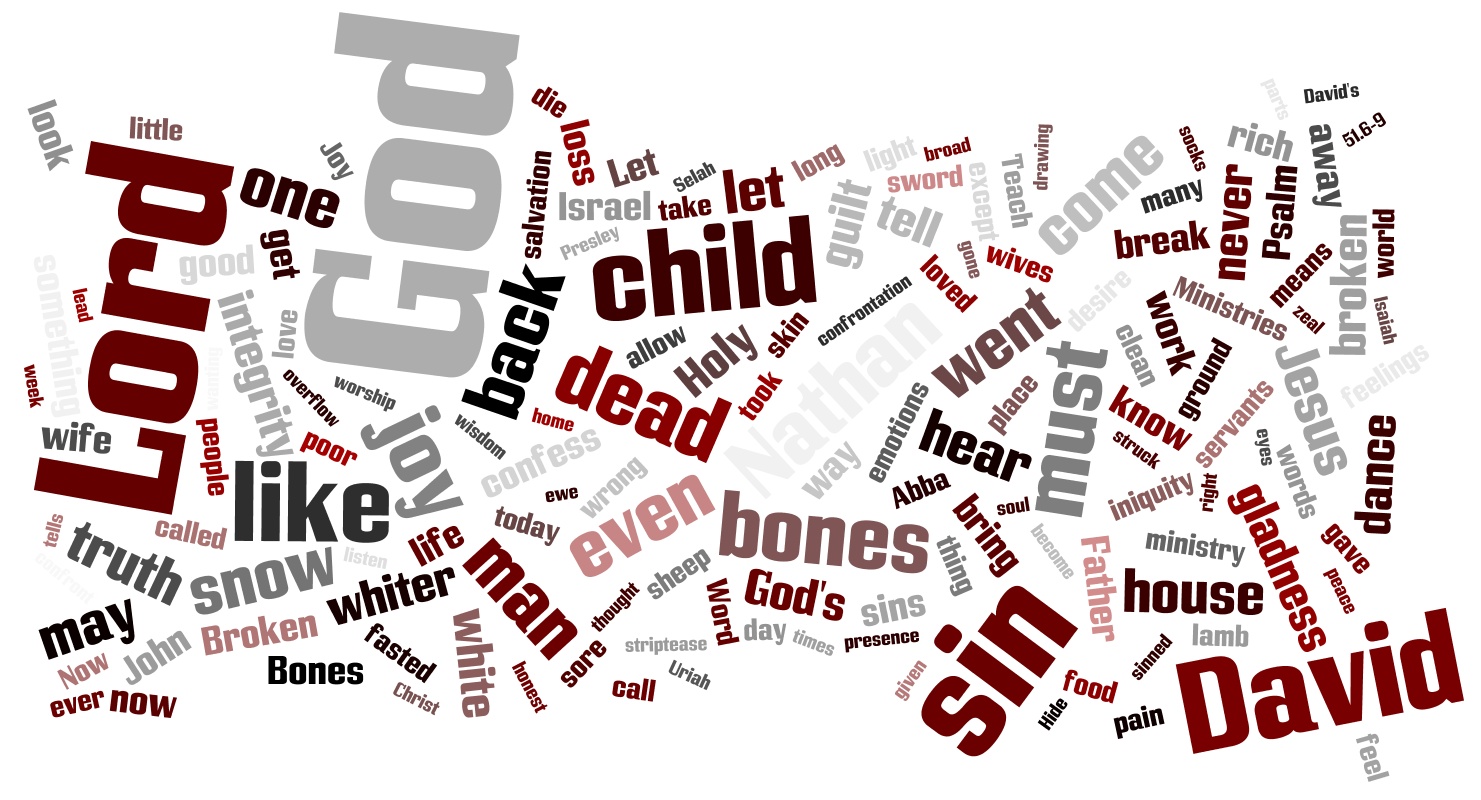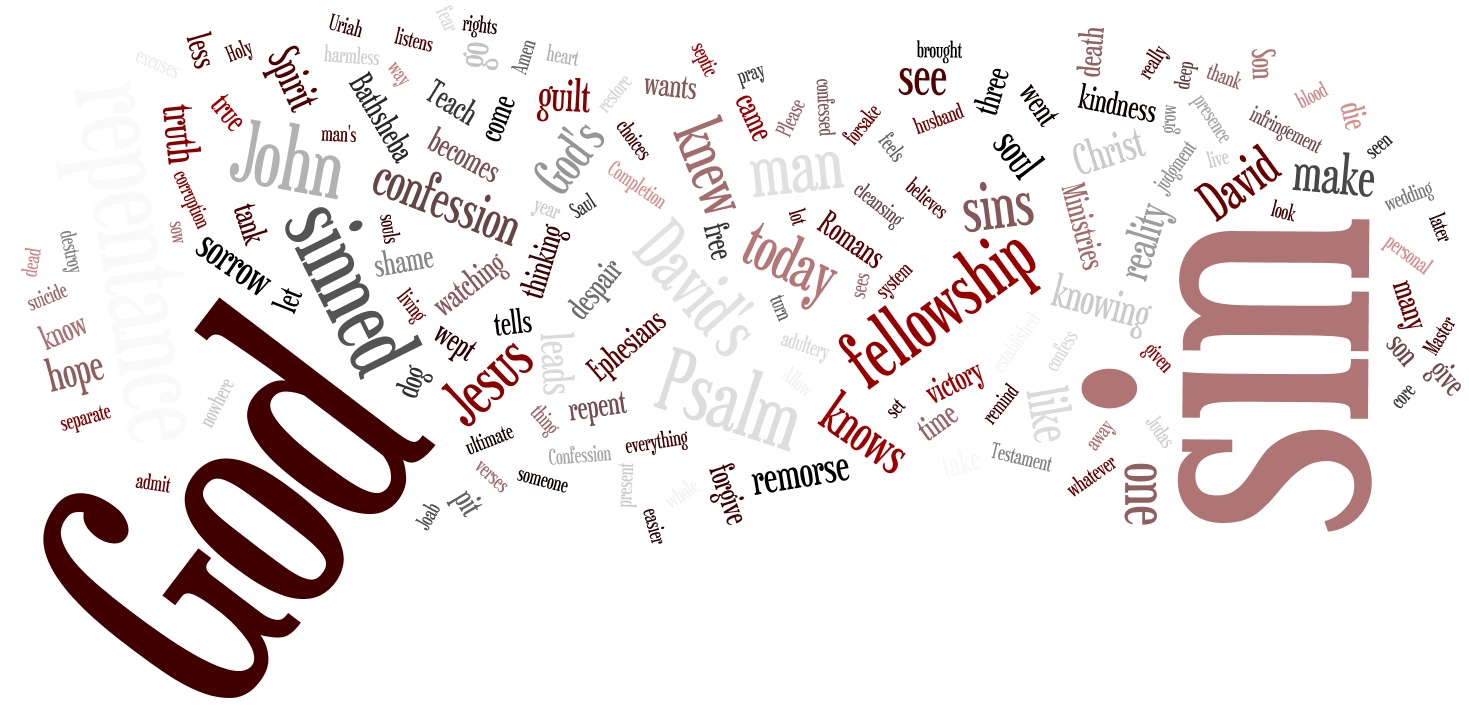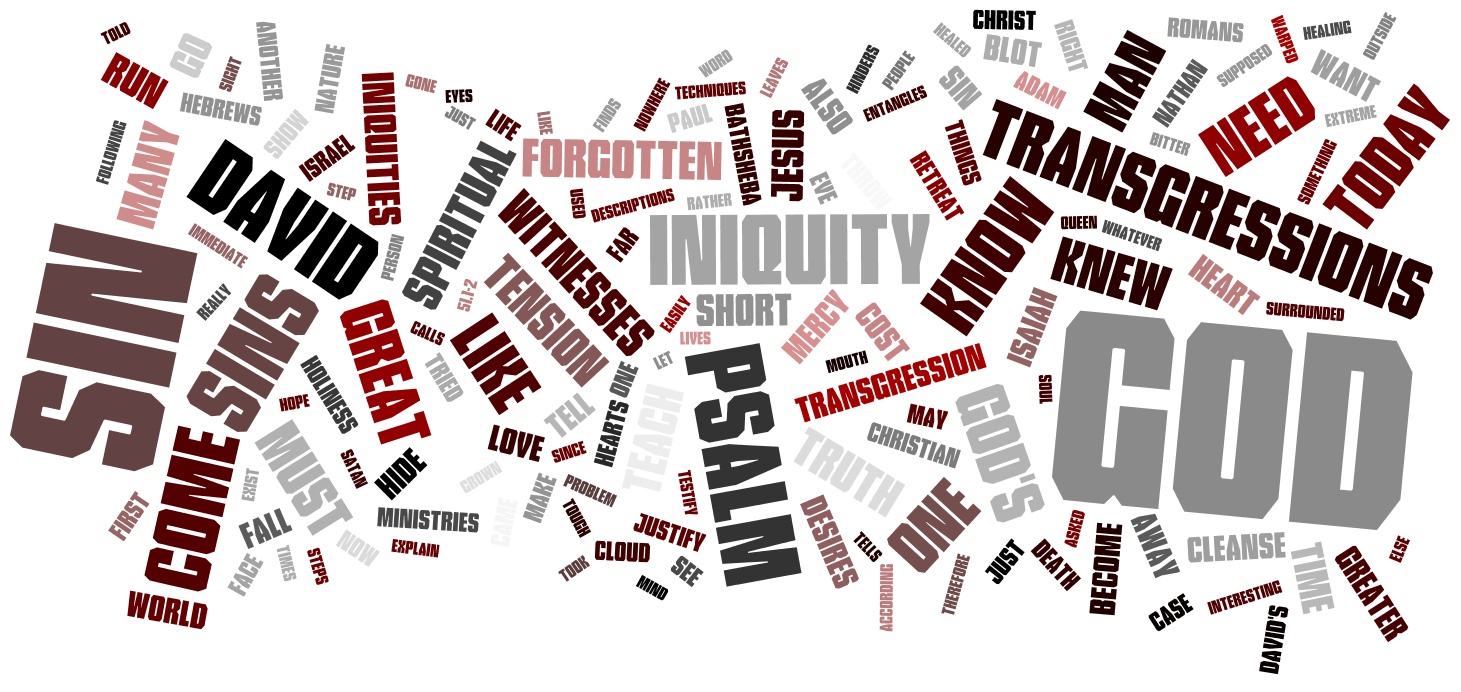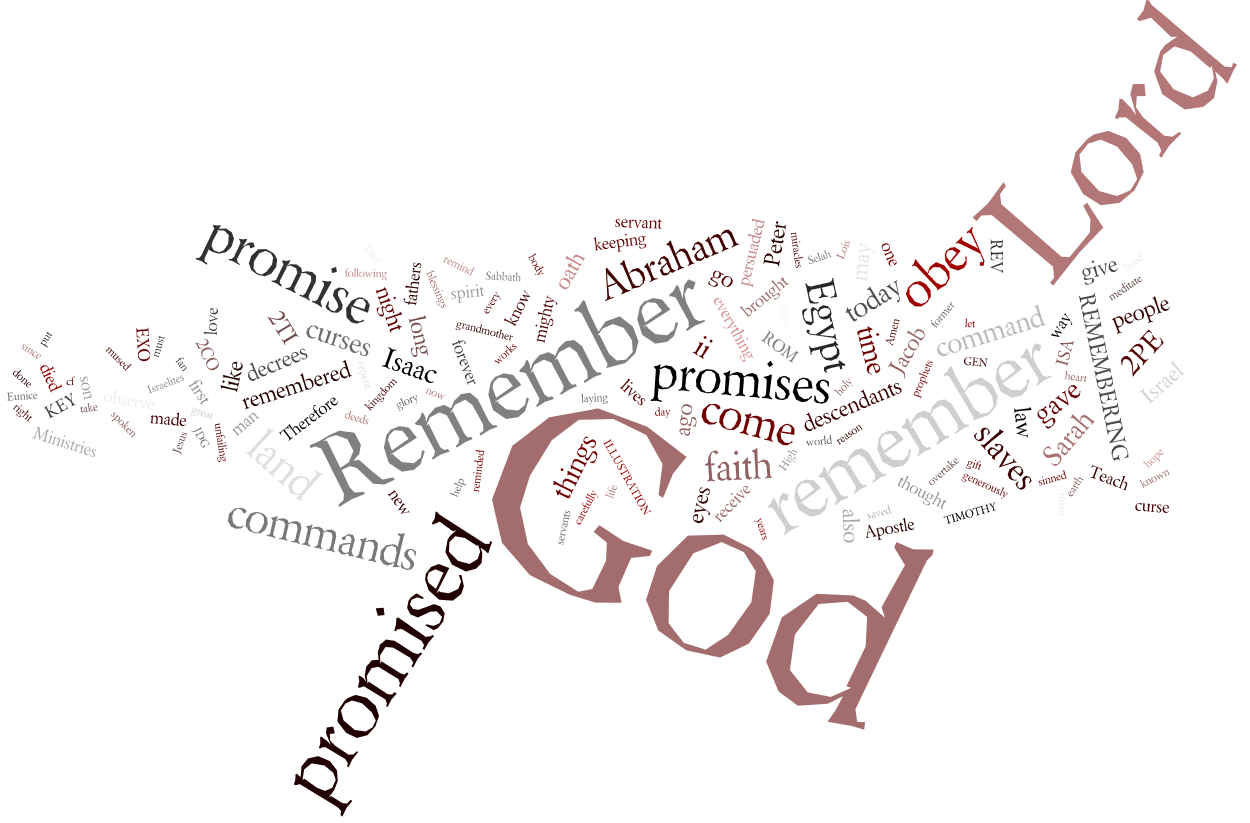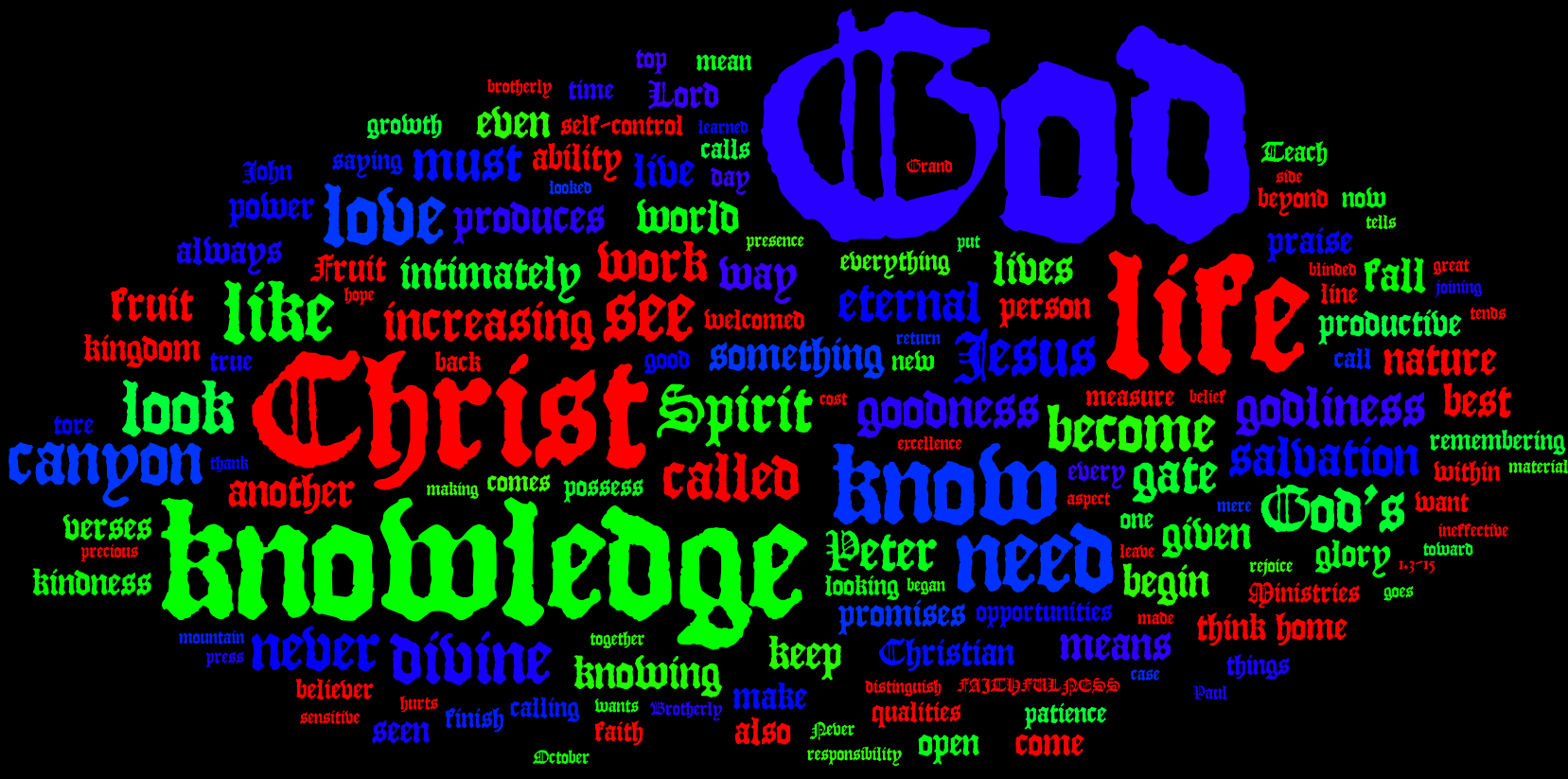| Dancing with Broken Bones-A Series on Psalm 51-The Audience is Listening | ||
| March 06, 1994 | Sermon by DRW | Passage Psalm 51.14-15 |
Save me from bloodguilt, O God, the God who saves me, and my tongue will sing of your righteousness. O Lord, open my lips, and my mouth will declare your praise.
Outline:
Introduction
Tourist trap like “Jesus of the Ozarks” (The Ozark’s Passion Play). The parking lot looked like Disneyland’s (huge). I remember when I went there with a friend of mine. The year was 1984, the year of hair and tans. Well, I had both: long hair and beard and brown skin. Any how, when I got out of the car a woman came up to me and asked if I played Jesus in the play because I was so “swarthy” looking. It was a mad house of religiosity. People came in checked shorts and argyles; in flower hats and dresses. It was a spectacle to behold. The message was told but the meaning was gone, for most. Much like church in some parts of the world and in some people’s lives. A place where people come to see where God might have been. Much like the windows with Mary of Jesus face glowing through it, a religious shrine to be visited with Polaroids but not experienced with the heart.
Today we will look at two types of worship: The counterfeit and the Real
I. The Counterfeits
A. Dry as Dust
The lifeless assembly looking more like a wax museum than a place where the living God could and should be worshiped. Or as Paul wrote to Timothy: having the form of godliness but denying its power.
1. there is much visible but not much reality
a. lack of depth and fellowship
(1) the motto: “we are here to do, not to be”
(2) appearance of but not really
(a) seen in activities
(b) cordial but not deep
i) saying “hi” to new people but
ii) no depth with the old people
b. true depth and fellowship
(1) fellowship is a group of people with one goal: Jesus Christ
(a) He saved them—and they speak of it
i) Romans 8 He brought them into the family
ii) Ephesians 2 He brought them from darkness to light
iii) Rom 6.23 He brought them from death to life
(b) He is developing them—and they share the truth of what God is doing (as iron sharpens iron, so one friend another)
i) 2 Timothy 3.14-17
a) instruction
b) correction
c) reproof
d) training in righteous
ii) 2 Co 3.18 changed from glory to glory
iii) 2 Co 5.17 transforming into new creation
(2) example of reality in fellowship with Dave Chen and myself
i) spiritual conversations
a) what God is doing
b) what God desires to do
c) evaluation of our services to God
d) topics of import
e) laughter
f) tears
ii) iron sharpening iron
a) honing our beliefs
b) sharing and reshaping our wants and desires
c) sharing our joys and hurts
Another aspect of a dry, lifeless assembly of worship is:
2. conformity without understanding
If the first aspect is due because of the attenders this one comes because of the leadership.
a. lack of knowledge of the spiritual undercurrent of what we do, why we do what we do.
(1) content is done without understanding why
* look at the bulletin
i) why do we do the center page activities?
ii) why do we make a bookmark for you to take with you?
(2) An example: why do we praise—God is worthy
(a) it is because we know what God has done for others (either through His Word, biographies, or fellowship) and what He has done for us and what He promised He’ll do;
(b) more so, as we shall see, it is because of who He is.
(3) worship is not going through the motions of
(a) singing
(b) reading
(c) unless they are directed to our God with full knowledge of who He is and what He has done. Our praise is sweeter the deeper we know Him.
Another counterfeit is
B. That’s Entertainment
1. Intentionally focusing on size and spectacle
a. God isn’t opposed to this when His glory is the focus
(1) Solomon at the Temple
(2) David and the Ark (2 Samuel 6.12f)
(3) Year of Jubilee
b. But today, we leave bedazzled but not deepened in relationship with anybody
(1) when discussion changes with the last song to “where to for food” then worship probably didn’t happen
(2) When God comes in our worship, we don’t worry about what’s next for we are with the God of the universe.
2. WHILE CHURCHES PLAY GAMES, AMERICA DIES!
One author feels that American Christianity is ill, and preaching a shallow gospel to those who desperately need substance and help. Bigness has become a standard for success. Churches have become entertainment centers. Christianity and Christians have never been, and never will be, popular or in the majority. “The job of Christianity is to worship God by the winning of souls.” This does not allow for shallowness or frivolity. The answer to this situation is in the Gospel message (Wells, 1989).
. 1. True Love Outreach is a good example of worship in evangelism
2. Picnic-on-the-Green is a good example of worship in fellowship
We’ve seen the counterfeit, now let’s look at
2. The Real Thing
1. True worship
Far from being a religious ritual, true worship is an individual reflecting a proper value judgment about God. In fact, the English word “worship” comes directly from the word “worth.” Our God is worth praising.
1. It is being dwarfed but drawn to Him
1. Isaiah 6.1-5
1. Worship is not just personal introspection, or we would worship our feelings. Worship is not even a warm glow, or we would worship that. We worship One outside ourselves. We concentrate on Him, we praise Him, we adore Him, we hear his Word for He is announcing it to us. We listen in holy awe to the word of God.
2. It is seeing Him, knowing only in Him are we worthy (“weight”) to be in His presence, attracted to be with Him, even though it could be uncomfortable for us.
1. when we encounter the light our darkness is shown
2. whenever we come into contact with God He changes us
2. Revelation 1.12-17
1. In His holiness we see our shortcomings, our sins;
2. the closer we come to Him in worship, daily living, the more we’ll desire to change to be more like Him for He shines His light on our darkness.
2. Christian worship is no tourist trap, no Polaroid; no desire to leave, time ceases, words are unnecessary, if there are words they are words of praise.
“In a world so polluted with empty, foolish, and hurtful words, let’s fill our hearts and homes, our workplaces and worship houses with a cleansing current of praise.” (Hayford, 2003).
3. Too often we cheapen our praise to a gratuity, a tip. If God performs right we will praise Him. David calls this “bloodguiltiness” and he forsakes it desiring only to truly praise God.
How do we break from tipping God with our church attendance and praises: these three things we need to know and do:
2. Majesty
Def: reverent respect due the splendor of royalty.
1. the American disposition against royalty shows we have an inbred resentment to majesty and must really work on seeing and respecting His majesty
2. When you see God as King you will fall down in worship.
1. When people come to an earthly king, they do not strut in and place demands
2. they bow awaiting commands.
3. Only when the royalty says arise do we.
3. God has called us to come boldly into His throne room.
1. this doesn’t mean to strut in but to have the confidence that He wants us there
2. and if He wants us there, according to 1 John 5, He will speak to us and we with Him
4. We come before Him, willing to wait for His voice, then we respond.
our response is awe:
3. Awe
Def: struck speechless with wonder
1. TV takes it away
1. joy and tragedy are controlled with a push of a button
2. Bangladesh doesn’t matter until it come to Arcadia
1. I was speaking with one of our own the other day. He told me he had never seen a homeless person before
2. until he went to LA
3. no remote control button could remove this reality for him
2. Our “I want it yesterday” mentality is against awe.
1. Awe doesn’t explode but overtakes in time to the point we are soaked in it
2. John 1.16 (waves)
3. look and be awed
1. mountains
2. churning ocean
3. stars
1. I was asked on a personality typing test what I do when I look at the stars
2. to my amazement it had “Stand in wonder of who God is”
3. that was my choice
TRANSITION: I like natural phenomena like rain, thunder and earthquakes … One personal encounter with a power that before was only theoretical can make all the difference. You live differently after that. You respect the power. You live in awe of its presence and tremble to think of its potential. Above all, you live in profound humility because you recognize your inability to control it.
If all this for created phenomena, then what of the Almighty God? I am reminded of the quote from C.S. Lewis’s “The Lion, the Witch and the Wardrobe,” where Mr Beaver describes the might and majesty of Aslan, the lion-God. When he finishes, Lucy asks, “Is-is he safe?” Replies Mr. Beaver: “Safe? Who said anything about safe? ‘Course he isn’t safe. but he’s good. He’s the King I tell you.” This is our God: hardly safe but thoroughly good. We cling to the King in fear, but much too afraid to let go (Ratzlaff, 1991).
Now that’s awe and that’s worship
4. Reverence
1. Mark 4.36-41
1. before the calming of the storm they feared death (natural)–36-38
2. after the calming of the storm they had a greater fear than the fear of death: the fear of the Author of life. (39-41)
2. Do not fear him who can kill just the body but fear Him who can destroy also the soul (Matthew 10.28)
CONCLUSION
Men have an inbred hunger to know God and see His greatness. Even though our more direct, personal glimpses of Him may be few, our response to Him should always be spontaneous and instinctive. David’s praise flowed freely. That’s the way it should be with all of us. The church does not have to wait to sample the exalting chorus of heaven. Rather, we must be willing to be transformed from lifeless assemblies and entertainment centers to the people of God, people who delight in praising the sublime, majestic Author of life. He simply refuses to be imprisoned either in color slides or in a one-hour time slot on Sundays. Rather, He wants our undivided attention, our entire being. When His people gather, He alone is the audience—the audience of One (p 129).
Let’s praise our God. Turn to your neighbour and praise God with them for who He is. I will ask the musicians to come and lead us in some praise songs before we give the closing word of encouragement.
Benediction
1 Chronicles 29.11-13
Yours, O Lord, is the greatness and the power and the glory and the majesty and the splendor, for everything in heaven and earth is yours. Yours, O Lord, is the kingdom; you are exalted as head over all. Wealth and honor come from you; you are the ruler of all things. In your hands are strength and power to exalt and give strength to all. Now, our God, we give you thanks, praise Your glorious name.
Be seated in prayer, then you are dismissed.
©2012 Teach for God Ministries. Used by Permission.
Permissions: You are permitted and encouraged to reproduce and distribute this material in any format provided that you do not alter the wording in any way and do not charge a fee beyond the cost of reproduction. For web posting, a link to this document on our website is preferred. Any exceptions to the above must be approved by Teach for God Ministries.
Please include the following statement on any distributed copy: By David R Williamson. ©2012 Teach for God Ministries. Website: www.teach4god.com
